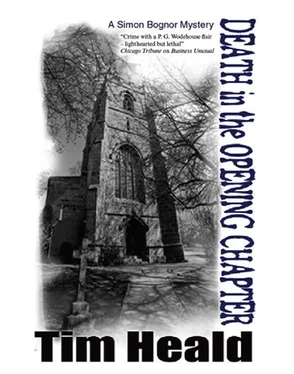Tim Heald - Death in the opening chapter
Здесь есть возможность читать онлайн «Tim Heald - Death in the opening chapter» весь текст электронной книги совершенно бесплатно (целиком полную версию без сокращений). В некоторых случаях можно слушать аудио, скачать через торрент в формате fb2 и присутствует краткое содержание. Жанр: Криминальный детектив, на английском языке. Описание произведения, (предисловие) а так же отзывы посетителей доступны на портале библиотеки ЛибКат.
- Название:Death in the opening chapter
- Автор:
- Жанр:
- Год:неизвестен
- ISBN:нет данных
- Рейтинг книги:5 / 5. Голосов: 1
-
Избранное:Добавить в избранное
- Отзывы:
-
Ваша оценка:
- 100
- 1
- 2
- 3
- 4
- 5
Death in the opening chapter: краткое содержание, описание и аннотация
Предлагаем к чтению аннотацию, описание, краткое содержание или предисловие (зависит от того, что написал сам автор книги «Death in the opening chapter»). Если вы не нашли необходимую информацию о книге — напишите в комментариях, мы постараемся отыскать её.
Death in the opening chapter — читать онлайн бесплатно полную книгу (весь текст) целиком
Ниже представлен текст книги, разбитый по страницам. Система сохранения места последней прочитанной страницы, позволяет с удобством читать онлайн бесплатно книгу «Death in the opening chapter», без необходимости каждый раз заново искать на чём Вы остановились. Поставьте закладку, и сможете в любой момент перейти на страницу, на которой закончили чтение.
Интервал:
Закладка:
Plenty of time, though, for some final flourishes, and now that he had got his gong, now that he was running an office, he felt unshackled. He still had time for dishing out surprises and even producing some bloody noses. This he enjoyed, and in young Contractor, he believed he had a willing and able accomplice.
‘Anything else, boss?’ his subordinate asked.
Bognor said there wasn’t anything else. Contractor hadn’t finished though. ‘From where I sit, it looks as if the vicar killed himself,’ he said. ‘Anyway, you’ll never prove anything else. If I were you, I’d enjoy the show. They say Allgood talks a better book than he writes. Which wouldn’t be difficult.’
‘I’ve heard that too,’ said Bognor. ‘In fact, I’m seeing him again any minute. I missed his session this morning. Talking to the widow, instead. Heavy going.’
‘Tough shit,’ said Contractor with a definite note of irony. Talking to widows was part of the job. It went with the territory. If you didn’t like it, then you should shuffle papers around like most civil servants in Whitehall.
‘I’ll look forward to your call,’ said Bognor, more or less meaning it. He put the phone down. He supposed he should use his mobile more and master texting. However, he didn’t care for the contraption and had been brought up to believe that a man should always be master of his machines. He was afraid that mobiles were gaining the upper hand, which was why he stuck to old-fashioned landlines wherever possible. He believed, probably wrongly, that where they were concerned, he was in charge.
He hated mobiles almost as much as he hated laptops but needs must. He told very few people his mobile number and even pretended to various interested parties that he disbelieved in them so bitterly that he did not own one. He liked the sort of telephone you wound up. His idea of a proper number was single figures and an exchange with letters like Juniper or Flaxman. He had a natural aversion to numbers and was in many ways a Luddite. He hankered after ink and a fountain pen even if he drew the line at a quill.
Now that he was nearing retirement, he worried more and more about the verdict of others, and especially of the Almighty and his minions. Because of his new ‘K’ and his position as boss of SIDBOT, he would qualify for obituaries in papers of what used to be called ‘record’. The Times, for instance. He did not wish to be the victim of simpering damnation with faint press. However, he very much suspected that he knew the identity of the principle author in that organ and he feared the worst. Never mind. He would be gone, and he doubted very much whether Murdoch papers were delivered wherever he was going. Monica would be cross though. He wanted young Contractor to write the signed piece in the Independent, which was his sort of thing, but the way things were going there would be no Independent by the time he snuffed it. It was a race to the death, and were he a betting man, he would put money on his own chances of winning this particular race. There was no handicap that he was aware of.
He didn’t believe in God, nor heaven, hell or purgatory, but that didn’t stop him hedging his bets with a dose of agnosticism, nor from speculating about the quality of his reception at the pearly gates. He didn’t think he had much time for St Peter anyway, and definitely believed that you got a better class of person in hell. On the other hand, he had seen enough Hieronymus Bosch in Bruges to feel apprehensive about the underworld – too much toasting fork and boiling oil, and not enough reading the Sporting Life over a pink gin.
He had a nasty feeling that St Peter would be patronizing. ‘All those talents we gave you and you ended up with a measly “K” and an insignificant office in Whitehall,’ the old saint would say, shaking his head and making notes with his quill. Bognor hated being patronized, especially by those such as Saint Peter, whom he regarded as his inferiors in almost every important respect. I mean, how many GCEs did St Peter hold? Had he ever passed a driving test? Just because he was once Bishop of Rome and a martyr. No justice. Had he, Bognor, been St Peter, he’d have made a much better fist of things. Instead of which, he was going to rot in hell.
Oh, well. He wondered if the Reverend Sebastian was rotting in hell, or merely stewing gently in purgatory, before the pearly gates rolled back and he ascended some frothy white biliousness. On balance, he’d rather be down under with Groucho Marx than on cloud nine with the Reverend Sebastian. Did suicides qualify for heaven? Would the Almighty accept his findings? He doubted it.
It seemed highly probable that Allgood had been being hypothetical. Unless he had somehow been privy to a publisher’s slush pile, there was no way in which he could possibly have known that the priest was keen to be printed. The sudden, mildly mysterious, death was grist to the literary lecturer’s mill. A slight exaggeration, a reasonable scintilla of doubt, these were allowable ingredients if it helped him concoct a good story. There was a maxim about never letting the facts interfere with such a thing, and Bognor would lay heavy odds that Martin Allgood subscribed to it. He would, wouldn’t he?
He had to accept, reluctantly, that if he were able to prove that the late vicar was murdered, he would receive no thanks. He would obviously get no thanks from the guilty party; none from the deceased or his family; nothing but opprobrium from the Fludds and others. Not for the first time, he was out on his own; on a limb which was in imminent danger of breaking and rendering him at best ridiculous, and at worst a bit of a pest. Sir Branwell and Camilla would forgive him; Monica and little Contractor would be quietly pleased. It would cut no ice with St Peter, nor the Fellows of Apocrypha College, whom he was always seeking to please. He wondered why he had chosen such an unpopular path in life. Not vocation certainly. Just human error.
He sighed again. In a quiet way, he was afraid he believed in right and wrong. His idea of tidiness was not the same as other peoples. It was the rest of the world that was out of step. That was his core belief and it sustained him. The rest of the world disagreed, but it knew, too, that they marched to a different tune.
Which was why he had to go and have further talks with little Allgood, and sort out the new loose ends the writer had exposed. He would not be thanked for it; it would lead nowhere; but it still had to be done.
TWENTY-THREE
No one liked Martin Allgood. This mattered comparatively little, since you weren’t supposed to like Martin Allgood and he worked hard at making affection a matter of indifference to him. In this, he nearly always succeeded. Contractor obviously didn’t care for Allgood, but he was too professional to let this interfere with his report.
Allgood had always been unpopular. In fact, it was virtually his stock-in-trade. At school he had been the school swot, pimpled with acne. School, according to the file, was a grammar school somewhere in Essex. Bognor was very bad at the geography of that county, though he shared the popular prejudice against it. He thought of the county – wrongly of course – as an urban sprawl dominated by Epping Forest, Leyton Orient Football Club and boxers training in Tudorbethan pubs, watched by criminals of a certain age in vicuna overcoats, which they didn’t remove even in oppressive heat. Males from Essex did not remove their hats indoors, and once you had made a few million you smoked large Havanas, lived in a gated community and made champagne cocktails with Dom Perignon and good cognac. It did not matter that Essex was not like that, nor that Allgood was in any way typical. Essex was not Essex, and Allgood was a one-off.
Читать дальшеИнтервал:
Закладка:
Похожие книги на «Death in the opening chapter»
Представляем Вашему вниманию похожие книги на «Death in the opening chapter» списком для выбора. Мы отобрали схожую по названию и смыслу литературу в надежде предоставить читателям больше вариантов отыскать новые, интересные, ещё непрочитанные произведения.
Обсуждение, отзывы о книге «Death in the opening chapter» и просто собственные мнения читателей. Оставьте ваши комментарии, напишите, что Вы думаете о произведении, его смысле или главных героях. Укажите что конкретно понравилось, а что нет, и почему Вы так считаете.












